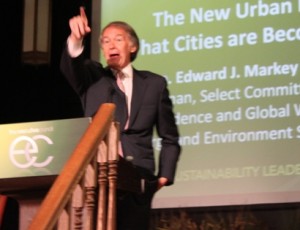By Eric McNulty
I had the pleasure of introducing Rep. Edward Markey for his opening keynote at the recent Executive Council Sustainable Cities leadership forum.
Markey has been at the forefront of the Congressional response to the Deepwater Horizon oil spill in the Gulf of Mexico, is the co-author of the Waxman-Markey climate change bill, and author of the bill that increased auto mileage standards for the first time in three decades. The League of Conservation Voters calls him the environment’s best advocate in Congress.
 Markey gave a fiery address about the need for the U.S. to become the leader in alternative energy. What I found interesting was his view that regulation can be a catalyst to those efforts. While many business leaders think that regulation in anathema to innovation, Markey disagrees. He pointed to his prior work on the Telecommunications Committee that shifted a segment of the broadcast spectrum into commercial use for cellular and other wireless communications. Without that regulatory move, the cell phone and broadband revolutions would have been greatly slowed or might never have happened at all.
Markey gave a fiery address about the need for the U.S. to become the leader in alternative energy. What I found interesting was his view that regulation can be a catalyst to those efforts. While many business leaders think that regulation in anathema to innovation, Markey disagrees. He pointed to his prior work on the Telecommunications Committee that shifted a segment of the broadcast spectrum into commercial use for cellular and other wireless communications. Without that regulatory move, the cell phone and broadband revolutions would have been greatly slowed or might never have happened at all.
The lesson is that the private and public sectors can be catalysts for each other. The private sector organizations pushing for adoption of a carbon cost bill (either a carbon tax or cap-and-trade) are hoping that it will spur another revolution. They are also, to be honest, hoping to seek regulatory advantage by getting a bill that aligns with their competitive position. Public players have their own interests, too. They are hoping to get jobs created in their districts, contributions from companies that do well as a result of the legislation, and have something to point to as accomplishment in the next election cycle.



